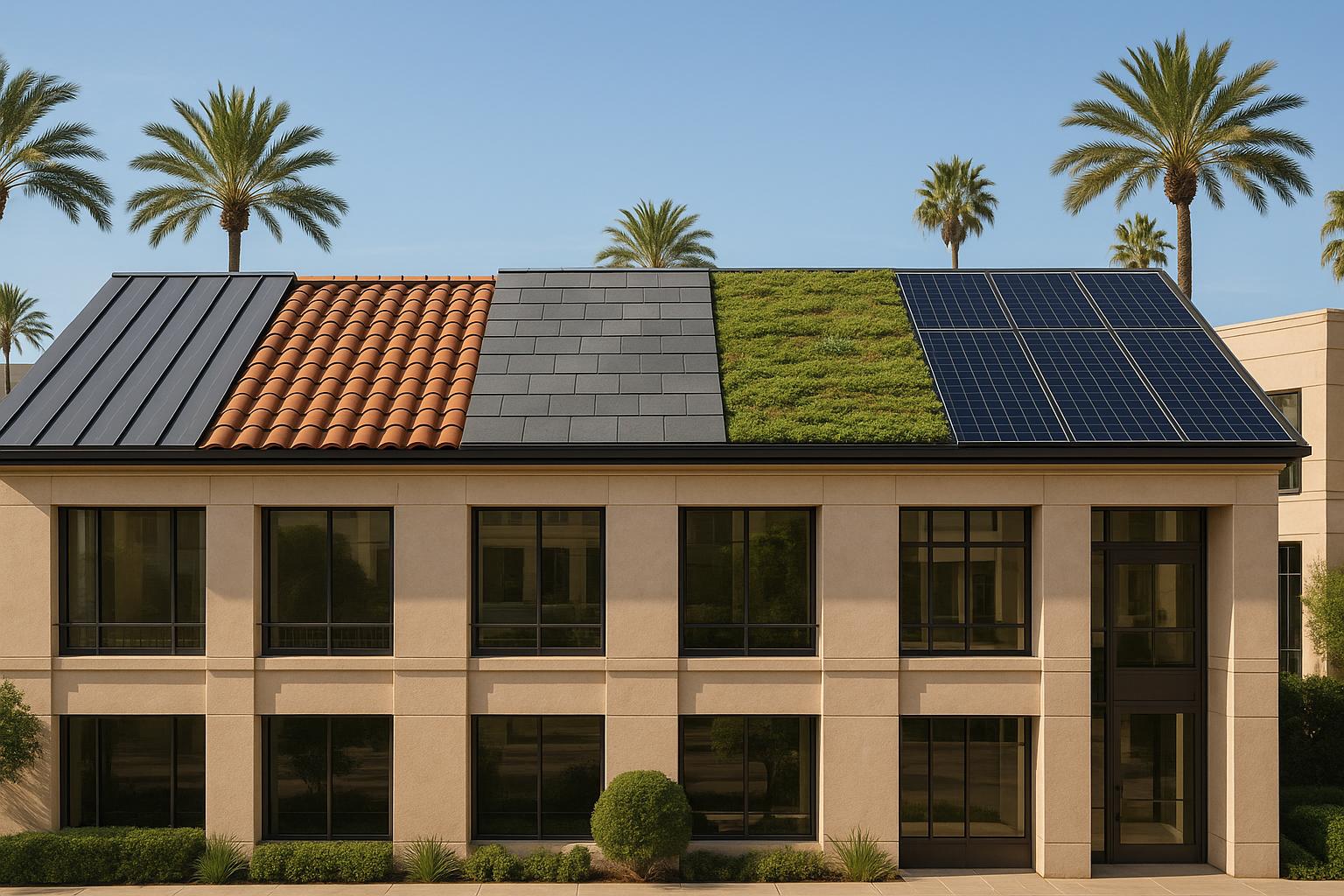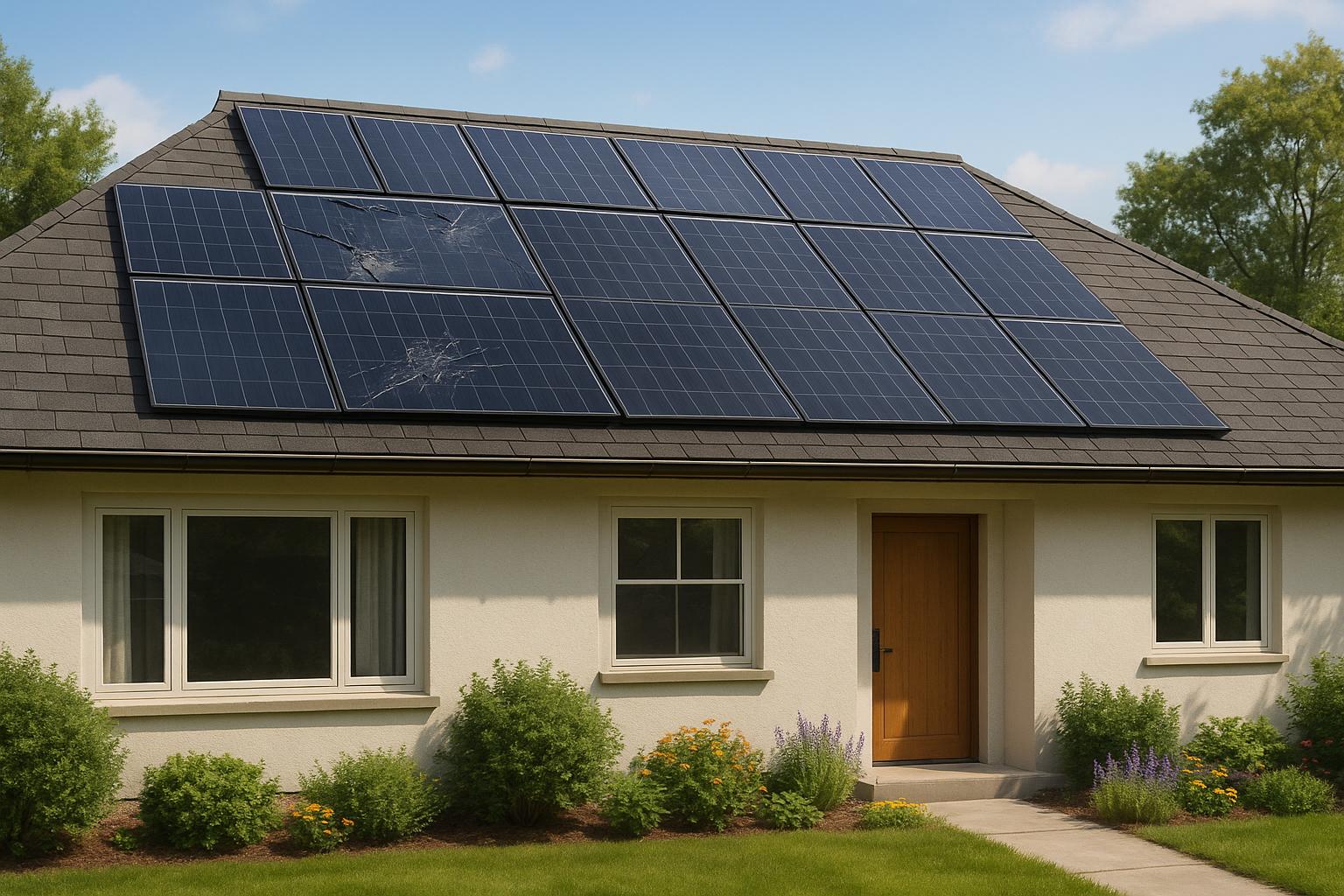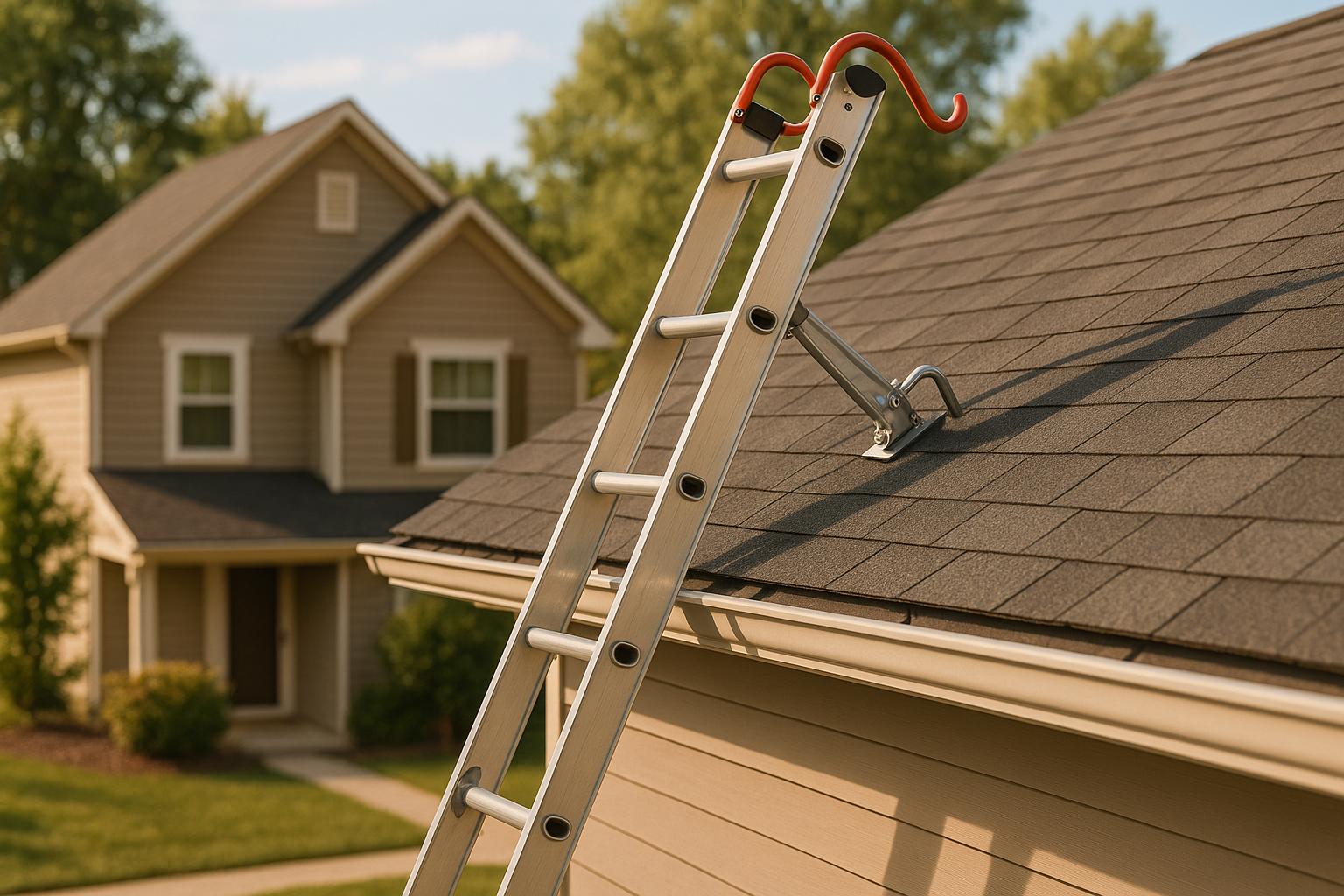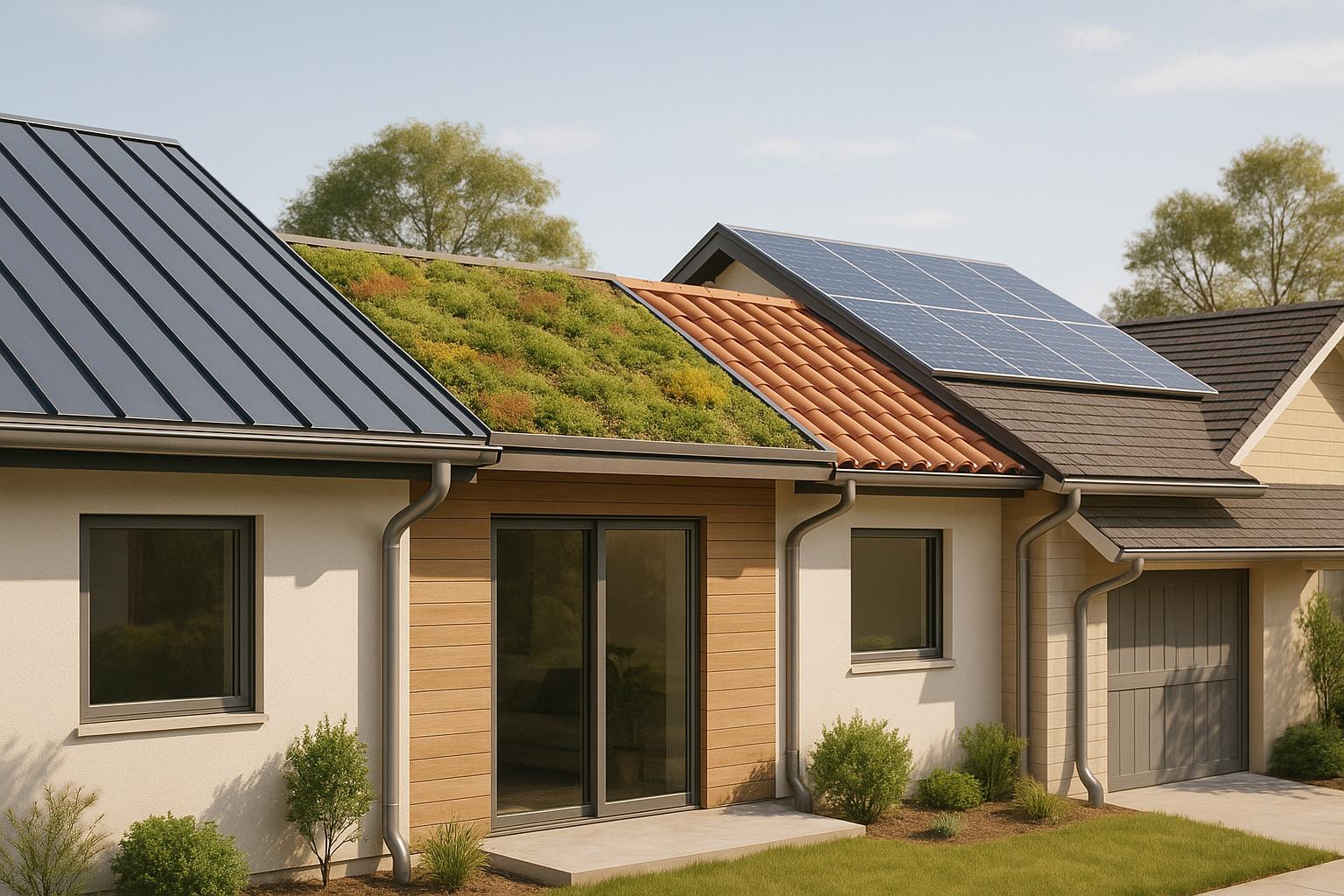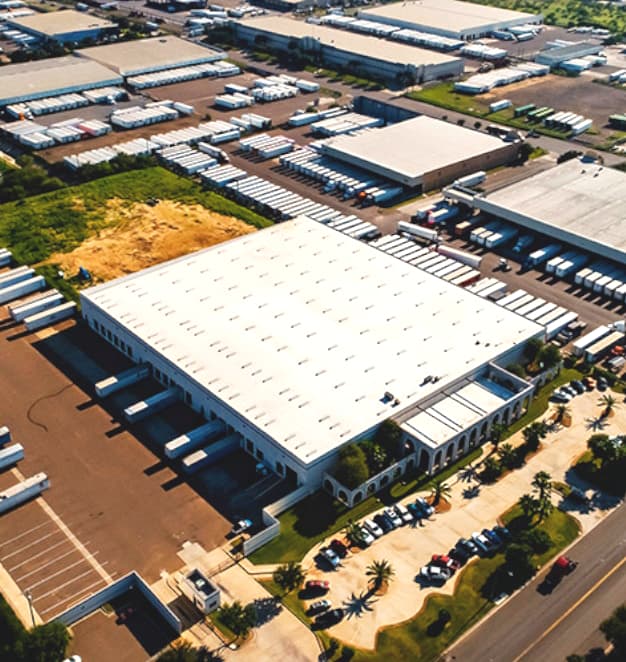When choosing roofing for commercial properties in Beverly Hills, durability, design, and performance in the local climate are key. Here are five options to consider:
- Clay and Concrete Tile: Long-lasting (50–100 years), fire-resistant, and highly customizable. Costs range from $10–$25 per square foot installed. Ideal for Mediterranean or Spanish designs.
- Slate: Extremely durable (up to 200 years) with a premium look. Costs $20–$35 per square foot. Suitable for elegant, timeless styles.
- Metal: Lifespan of 30–70+ years, lightweight, and energy-efficient. Costs $7–$25+ per square foot. Works well with modern or industrial aesthetics.
- Modified Bitumen and Built-Up Roofing: Affordable ($4–$7.50 per square foot) and reliable for flat or low-slope roofs. Focused on functionality over design.
- Synthetic Roofing: Mimics natural materials like slate or wood, lasts 30–50 years, and costs $7–$20 per square foot. Offers a balance of cost and design flexibility.
Quick Comparison
| Material | Lifespan | Cost per Sq Ft Installed | Key Features | Best for |
|---|---|---|---|---|
| Clay & Concrete Tile | 50–100 years | $10–$25 | Fire-resistant, customizable | Mediterranean/Spanish designs |
| Slate | 75–200 years | $20–$35 | Premium look, low maintenance | Elegant, timeless styles |
| Metal | 30–70+ years | $7–$25+ | Lightweight, energy-efficient | Modern/industrial aesthetics |
| Modified Bitumen | 15–30 years | $4–$7.50 | Affordable, durable for flat roofs | Functional low-slope roofs |
| Synthetic Roofing | 30–50 years | $7–$20 | Mimics natural materials, durable | Cost-effective custom designs |
For Beverly Hills, consider fire resistance, UV durability, and energy efficiency when selecting a material. Proper installation and maintenance are crucial to maximizing performance and lifespan.
1. Clay and Concrete Tile Roofing
Clay and concrete tiles bring a classic Mediterranean charm combined with durability, making them a smart choice for commercial properties in Beverly Hills.
One standout feature of tile roofing is its fire resistance. Given the wildfire risks in the area, this quality is invaluable. Both materials achieve the highest fire ratings, offering a strong layer of protection for commercial investments.
"Clay and concrete tile are by far the most cost-effective, attractive, long-lasting roofing material for any residential or commercial structure." – TRI Alliance
Durability
When it comes to performance, clay and concrete tiles are built to last. Clay tiles can endure for over 100 years, while concrete tiles offer lifespans of 50+ years. They also handle winds up to 200 MPH. This durability is thanks to their weight and interlocking design, which creates a sturdy shield against harsh weather.
Another key advantage is their seismic performance. Tile roofing is the only option tested specifically for seismic stress, making it a great fit for earthquake-prone Southern California.
Cost Range (USD per Square Foot)
The cost of tile roofing depends on the material and style:
- Clay tiles: Material costs range from $3-$7 per square foot, with installation costs between $8-$25 per square foot. High-end terracotta options can go up to $10-$25 per square foot installed.
- Concrete tiles: A more affordable option, with materials priced at $2-$4 per square foot and installed costs from $7-$19 per square foot.
Style choices also influence pricing. Spanish-style tiles typically cost $8-$15 per square foot installed, while French tiles range from $9-$22 per square foot. Custom colors can add $0.50-$5 per square foot.
Customization Potential
Both clay and concrete tiles offer extensive design options, allowing for unique and striking commercial roofs. Concrete tiles can mimic the look of wood shake, clay, or slate.
Clay tiles, on the other hand, are available in virtually any color and come in a variety of shapes. Companies like VHR Roof Tile Manufacturing even create custom colors to match specific design needs.
For architectural accents, specialized shapes like tapered or graduated designs can help achieve a distinctive look. This customization, paired with low maintenance, makes these materials a versatile choice.
Maintenance Requirements
Tile roofs are known for their low maintenance needs, which adds to their long-term value. The main upkeep involves replacing any broken tiles promptly to avoid water damage.
Routine inspections are key to catching issues early. It’s worth noting that clay tiles are more fragile underfoot compared to thicker concrete tiles, so professional maintenance is often recommended to preserve their integrity.
Aesthetic Versatility
On top of their performance, clay and concrete tiles are visually appealing and can evolve beautifully over time. Clay tiles develop natural color variations, adding character as they age, while concrete tiles maintain consistent coloring throughout their lifespan.
These materials work well with a variety of architectural styles, from Mediterranean-inspired designs to modern commercial buildings. Flat or rounded tile options can replicate wood shakes or even mimic centuries-old European roofs, some of which have lasted over 400 years.
2. Slate Roofing
Slate roofing brings a blend of timeless elegance and reliable protection, making it an excellent choice for commercial properties in Beverly Hills.
Durability
Slate is known for its incredible longevity and resilience. With a lifespan that can exceed 150 years, it stands up to heavy rain, strong winds, and temperature swings without breaking a sweat. Its stability under changing temperatures reduces the risk of cracks and leaks, ensuring long-term performance.
Another standout feature is its fire resistance. Slate boasts a Class A fire rating, meeting California’s strict fire safety standards for both new construction and reroofing projects.
"With our Class A fire rating, North Country Slate shingles meet the needs in the state’s fire zones for both new construction and reroofing." – North Country Slate
Additionally, slate holds an ASTM S1 grading, the highest standard for weather resistance. Even if damage occurs, individual tiles can be replaced without disrupting the entire roof system, provided the work is done by skilled professionals.
Cost Range (USD per Square Foot)
Slate roofing is a premium option, and the cost depends on the type and quality of slate you choose:
| Slate Type | Cost Range per Square Foot |
|---|---|
| Natural Slate | $20-$35 |
| Synthetic Slate | $8-$15 |
| Hybrid Slate | $14-$23 |
For natural slate, pricing varies further based on its hardness. Hard slate typically ranges from $20-$30 per square foot, while soft slate costs between $10-$30 per square foot. The grading system also plays a role, with S-1 tiles (the highest rating) priced at $5-$7 per square foot, S-2 tiles at $3-$5 per square foot, and S-3 tiles at $2-$3 per square foot.
Labor accounts for a significant portion of the total cost, making up 50%-60% of installation expenses. Additionally, the weight of slate – ranging from 800 to 1,000 pounds per 100 square feet – may necessitate structural reinforcements, which can add to the overall investment.
Customization Potential
Slate is highly versatile when it comes to design, offering a range of options to suit various architectural preferences. Each tile is naturally unique, with distinct patterns, textures, and colors that ensure no two roofs look exactly alike.
Beyond the classic gray and black tones, slate comes in rare shades of purple and green, adding a touch of individuality. Over time, these natural colors often develop richer hues, giving the roof even more character and depth.
This adaptability allows slate to complement everything from sleek modern designs to ornate Victorian architecture, making it a popular choice for commercial properties aiming to stand out in Beverly Hills.
Maintenance Requirements
One of slate’s key advantages is its low maintenance needs. Thanks to its natural durability, slate requires minimal upkeep over its long lifespan. When repairs are necessary, they usually involve replacing individual tiles rather than undertaking extensive fixes.
To ensure optimal performance, it’s crucial to hire contractors with specialized expertise in slate roofing. They should also source high-quality materials from reputable suppliers.
"Proper product selection & Design is a key component in a Superior Roof System and this is why we choose NCS!" – Chad Brandon
Aesthetic Versatility
Slate roofing delivers a classic, sophisticated look that enhances property values, especially in high-end markets like Beverly Hills. Its natural beauty, combined with subtle variations in color and texture, creates a visually striking effect.
With a lifespan of up to 150 years, slate not only provides long-term durability but also maintains its aesthetic appeal for generations. Its ability to elevate the appearance of commercial properties while offering practical benefits makes it a standout choice for those seeking both luxury and functionality.
For commercial properties in Beverly Hills, slate roofing strikes the perfect balance between elegance and performance, offering a visually stunning and enduring solution that continues to impress over time. This combination of beauty and practicality sets the stage for exploring other advanced roofing materials.
3. Metal Roofing
Metal roofing brings a sleek, modern look and dependable performance to commercial properties in Beverly Hills. Known for its durability, adaptability, and potential for long-term savings, it’s an increasingly popular choice for building owners.
Durability
Metal roofs are built to last, often enduring 70 to 100+ years, far outpacing the lifespan of asphalt shingles, which typically require replacement every 15–20 years. Designed to withstand heavy rain, strong winds, and hail, these roofs maintain their integrity without faltering.
In Beverly Hills, where annual rainfall averages around 16 inches, this durability is particularly beneficial. Additionally, metal roofs boast a Class A fire rating, a critical feature in California’s fire-prone areas. Their lightweight nature – about 1.4 pounds per square foot – also reduces stress on building structures. These qualities make metal roofing a practical, high-performance option.
"Metal roofs are known for their longevity, resistance to extreme weather, and low maintenance requirements, making them an excellent choice for both residential and commercial buildings." – Roofing Supplies
Cost Range (USD per Square Foot)
The cost of metal roofing depends on the material and installation complexity. Here’s a breakdown for commercial properties:
| Metal Type | Cost Range per Square Foot |
|---|---|
| Galvalume Steel | $4–$9 |
| Aluminum | $9–$14 |
| Galvanized Steel | $7–$17 |
| Zinc | $12–$20 |
| Stainless Steel | $10–$16 |
| Copper | $15–$25+ |
Standing seam metal roofs cost between $10 and $16 per square foot, while corrugated options are more affordable at $7 to $12 per square foot. Labor typically accounts for 50–70% of the total cost. For a standard 1,700-square-foot roof, expenses can range from $6,800 to $51,000. While the initial cost is 1.5–2.5 times higher than asphalt shingles, the long-term savings – thanks to reduced maintenance and energy cost reductions of 10–25% – make it a worthwhile investment.
Customization Potential
Metal roofing shines when it comes to design options, making it perfect for custom commercial projects. Its versatility allows it to complement a broad range of architectural styles, from sleek modern designs to more classic aesthetics.
"We customizes roofing to diverse design needs." – Eclipse Remodeling & Roofing Inc.
Color choices are nearly endless. Standing seam metal roofs, for example, come in finishes ranging from natural metallic tones like silver or copper to custom colors that align with a building’s design. Factory pre-coating can even replicate the appearance of wood shakes or asphalt shingles. Surface finishes – whether matte, glossy, or textured – add another layer of customization. Features like custom-cut panels, specialty coatings, and solar panel integration offer tailored solutions that meet specific project needs. For Beverly Hills businesses, these options combine style with long-term functionality.
Maintenance Requirements
Metal roofs are low-maintenance, requiring only annual inspections to ensure they remain in top condition.
"Metal roofing offers a range of benefits that go beyond its aesthetic appeal. From exceptional durability and longevity to energy efficiency and sustainability, metal roofs provide a well-rounded solution for both residential and commercial properties." – GreenCal Construction
Professional installation is critical to maximizing performance and minimizing future issues. A qualified contractor can help avoid common problems and keep maintenance costs low.
Aesthetic Versatility
Metal roofing offers a wide range of aesthetic options for commercial properties. Each metal type brings something unique: copper develops a striking patina over time, while aluminum offers durability at a more affordable price. Styles like standing seam, metal shingles, tiles, and corrugated panels ensure there’s a look for every vision.
For businesses in Beverly Hills, metal roofing is more than just a practical choice – it’s an investment in both immediate curb appeal and long-term reliability.
4. Modified Bitumen and Built-Up Roofing
Modified bitumen and built-up roofing are reliable choices for flat or low-slope commercial roofs in Beverly Hills. Built-up roofing, in particular, has been a trusted option for over a century, thanks to its resilience and long-standing performance record.
Durability
Built-up roofing owes its strength to multiple layers of bitumen and reinforcing fabrics. Each layer adds to its weather resistance and overall durability. These roofs typically last 20–30 years, with built-up designs often reaching up to 40 years because of their multi-layered construction.
Modified bitumen roofs are designed to resist tears and punctures. The inclusion of APP modifiers enhances heat resistance and UV protection, while SBS modifiers improve flexibility and performance in colder climates. This makes them capable of withstanding extreme temperatures, heavy rainfall, snow, and hail.
While they may not boast the visual appeal of metal or tile roofing, these systems deliver unmatched reliability and cost-effectiveness for commercial properties.
Cost Range (USD per Square Foot)
Modified bitumen roofing offers an affordable solution for commercial installations, with costs ranging between $4.00 and $7.50 per square foot installed. Here’s a breakdown of typical expenses:
| Cost Component | Price per Square Foot |
|---|---|
| Old roof removal | $1.00 – $1.30 |
| Materials and supplies | $0.70 – $2.20 |
| Installation labor | $2.30 – $4.00 |
| Total cost | $4.00 – $7.50 |
For a roof measuring around 1,500 square feet, the total investment could range from $6,000 to $22,500. This price range makes modified bitumen an economical choice, especially for low-slope or flat roofs, with plenty of room for customizations to meet specific building needs.
Customization Potential
Modified bitumen systems offer flexibility in installation methods, including mechanical attachment, partial bonding, or full bonding. Built-up roofing, on the other hand, allows for various finishes such as stone, gravel, aluminum coatings, or elastomeric sealants, providing options to meet both functional and aesthetic goals.
Maintenance Requirements
Modified bitumen roofs are quicker and easier to install, which helps lower labor costs and saves time. Their flexibility minimizes common issues like seam splitting or tears caused by building movement or thermal expansion. For the best results, professional roofing contractors should handle both the installation and ongoing maintenance.
Aesthetic Versatility
Though these systems focus on practicality, they offer subtle aesthetic benefits. Built-up roofs can be finished with materials like stone, gravel, or elastomeric coatings, giving commercial properties in Beverly Hills a polished and professional look. These understated finishes provide durability while leaving room to explore more design-focused roofing options in the future.
sbb-itb-d1d6490
5. Synthetic Roofing Materials
Synthetic roofing materials offer a modern alternative to traditional options, blending the look of natural materials with the benefits of advanced engineering. Designed to mimic the appearance of slate, cedar shakes, or tile, these materials deliver performance features that make them a smart choice for commercial properties in Beverly Hills’ challenging climate.
What sets synthetic roofing apart is its focus on durability and weather resistance. These materials are built to handle high winds, UV exposure, heavy rain, and even hail. With wildfire risks on the rise, fire resistance has become a crucial factor, and synthetic options are designed to meet this need head-on. The result is a roofing solution that combines lasting strength, cost efficiency, and design adaptability.
Durability
Synthetic roofing stands out for its impressive lifespan, often lasting 40 to 50 years when installed properly. Its engineered composition eliminates common issues like cracking, rotting, or splitting, ensuring long-term reliability.
These materials also excel in resisting damage from weather, fire, and impacts. Unlike traditional options that can fade or weaken under California’s intense sun and unpredictable weather, synthetic roofs maintain their structure and appearance for decades. Many products even achieve Class A fire ratings, offering maximum protection against wildfires – a growing concern for properties in Beverly Hills.
Cost Range (USD per Square Foot)
Synthetic roofing materials strike a balance between affordability and premium quality. Here’s a breakdown of typical costs:
| Material Type | Cost per Square Foot |
|---|---|
| Synthetic tile | $6.00 – $10.00 |
| Synthetic cedar shakes | $7.00 – $11.00 |
| Synthetic slate | $8.00 – $12.00 |
| Premium synthetic slate | $10.00 – $20.00 |
For composite roofing systems, installation costs generally range from $7 to $14 per square foot. While synthetic materials are pricier than basic asphalt shingles, they offer better value compared to natural slate, which can cost $10 to $30 per square foot. Additionally, synthetic materials are lightweight, reducing installation costs by eliminating the need for structural reinforcements often required for heavier natural materials.
Customization Potential
Synthetic roofing is incredibly versatile, offering design options to suit any architectural style. These materials can replicate the look of wood, slate, clay, or metal with impressive precision. The manufacturing process allows for detailed control over color, texture, and finish, enabling property owners to match existing designs or create something entirely unique.
"Roofs are more than just protection – they express individuality and style. Tailored designs allow homeowners to express themselves, making each roof unique." – CNRoofs.com Author
Modern synthetic tiles can be molded to achieve bold colors and intricate textures, supporting the trend toward distinctive architectural statements. Whether you’re aiming for a classic or contemporary look, synthetic roofing can bring your vision to life.
Maintenance Requirements
One of the biggest advantages of synthetic roofing is its low maintenance. These materials are engineered to resist issues like warping, cracking, and weather-related wear. This means fewer repairs and less upkeep over the years.
Professional installation is key to maximizing performance. Local experts can ensure the system is installed correctly, allowing you to fully benefit from the material’s durability and reliability.
Aesthetic Versatility
Synthetic materials deliver the high-end look expected in Beverly Hills while offering a range of design possibilities. For example, synthetic slate tiles exude luxury and elegance, while synthetic wood and Spanish-style tiles create authentic designs that work well with various architectural styles.
Thanks to advanced engineering, these materials closely replicate the color, texture, and style of natural options. This attention to detail ensures a premium appearance without the premium cost.
As property owners in the Los Angeles area increasingly prioritize both visual appeal and environmentally friendly choices, synthetic roofing materials offer a compelling balance of style, performance, and eco-consciousness. These qualities make synthetic roofing a standout option when comparing different materials.
Material Comparison Chart
Selecting the right roofing material for your Beverly Hills commercial property can feel overwhelming, but comparing key factors side by side makes the process much easier. Below is a chart that breaks down important details like lifespan, cost, customization, maintenance, and design flexibility for different roofing materials:
| Material | Lifespan | Cost per Sq Ft | Customization Options | Maintenance Needs | Design Flexibility |
|---|---|---|---|---|---|
| Clay & Concrete Tile | 50–100 years | Clay: $15.00–$25.00 Concrete: $10.00–$18.00 |
Wide variety of colors, textures, and custom profiles | Moderate – regular inspections and tile replacement | High – Mediterranean, Spanish, and contemporary styles |
| Slate | 75–200 years | $20.00–$30.00+ | Natural color variations with custom cut options | Low – minimal repairs required | Medium – timeless, elegant designs |
| Metal | 30–70+ years | Steel/Aluminum: $12.50–$20.50 Copper/Zinc: $20.00–$25.00+ |
Multiple profiles, colors, and finishes | Very Low – occasional cleaning | Very High – works with modern, industrial, and traditional styles |
| Modified Bitumen | 15–25 years | $4.00–$7.50 | Limited to granule color options | Moderate – regular inspections needed | Low – focuses on functionality |
| Synthetic | 30–50 years | $7.00–$18.00 | Mimics natural materials with customizable textures | Very Low – built for long-lasting performance | High – replicates various architectural styles |
Let’s break these factors down further.
When it comes to durability, slate roofing stands out with an impressive lifespan of 75–200 years, followed by clay and concrete tiles lasting 50–100 years. Metal roofing offers a solid range of 30–70+ years, while synthetic materials hold up for 30–50 years. On the other hand, modified bitumen, while affordable, has a shorter lifespan of 15–25 years.
Speaking of cost, modified bitumen is the most budget-friendly option, priced at $4.00–$7.50 per square foot. At the higher end, premium materials like slate and copper can exceed $25.00 per square foot, offering unmatched longevity and aesthetic appeal.
Design flexibility is another key consideration. Metal roofing adapts easily to both modern and traditional architectural styles, while synthetic materials can replicate the look of natural textures. Clay and concrete tiles shine in Mediterranean and Spanish-inspired designs, making them a popular choice in Beverly Hills.
"Choosing the best commercial roofing material requires careful consideration of durability, cost, energy efficiency, and the unique needs of your building." – Rami Tawasha, Senior Project Manager at Constructive Solutions, Inc.
Maintenance needs vary significantly across materials. Slate and synthetic roofing require minimal upkeep, while modified bitumen benefits from more frequent inspections. Metal roofs, when installed correctly, only need occasional cleaning to maintain their appearance and functionality.
For properties prioritizing longevity, slate or high-quality tile systems are excellent choices. If design versatility is a top priority, metal and synthetic options offer plenty of creative freedom. Meanwhile, budget-conscious projects can achieve reliable performance with modified bitumen or concrete tiles.
Finally, the local climate plays a crucial role in material selection. Beverly Hills faces intense UV exposure, wildfire risks, and occasional severe weather, making durability and weather resistance essential. Materials like metal, slate, and synthetic roofing perform particularly well under these conditions, provided they are installed properly. This comparison highlights the strengths of each option, helping business owners make informed decisions tailored to their specific needs.
Conclusion
Choosing the right roofing material for your Beverly Hills commercial property means finding the perfect balance between durability, design, and long-term value. The materials we’ve discussed not only enhance your building’s appearance but also provide dependable protection for years to come.
Slate and clay tiles are standout options for those seeking premium quality. Known for their impressive lifespans – up to 75 years or more – they deliver a classic, sophisticated look that reflects stability and elegance. While their upfront cost is higher, their durability and minimal maintenance needs often lead to significant savings in the long run.
If versatility is what you’re after, metal roofing is hard to beat. It effortlessly complements both modern and traditional architectural styles, offers energy efficiency, and provides flexible design options. This makes it an excellent choice for businesses aiming for functionality without sacrificing aesthetics.
For businesses working within tighter budgets, modified bitumen and synthetic materials are practical alternatives. Synthetic materials, in particular, mimic the look of natural textures while requiring minimal upkeep, offering a cost-effective solution that still delivers on appearance and performance.
Given the Beverly Hills climate, which includes intense UV exposure, high temperatures, and the occasional severe weather event, it’s critical to choose materials that can handle these conditions. Professional installation and regular maintenance play a key role in ensuring your roof performs at its best. In fact, proper care can extend a roof’s lifespan by 5–15 years, depending on the material.
For installation and maintenance tailored to Beverly Hills properties, Prime American Roofing offers the expertise you need. Their team specializes in durable materials and custom designs, ensuring your roof not only looks exceptional but also stands up to the demands of the local climate. From installation to inspections, they provide comprehensive services to keep your investment protected.
FAQs
What should I consider when selecting a roofing material for my commercial property in Beverly Hills?
When choosing a roofing material for your commercial property in Beverly Hills, you’ll want to weigh durability, cost, and style. Think about how well the material can handle the local climate, which includes plenty of intense sunlight and the occasional rain. Another factor to keep in mind is energy efficiency – options like reflective cool roofing systems can help reduce heat absorption, which translates to lower energy bills.
For a sophisticated look that matches Beverly Hills’ upscale vibe, materials like metal roofing or clay tiles are great options. On the other hand, if you’re working with a tighter budget, asphalt shingles provide a reliable and affordable solution. Striking the right balance between practicality and design ensures your roof not only performs well but also adds to the overall appeal of your property.
How does Beverly Hills’ climate impact the durability and performance of roofing materials?
The warm and sunny weather in Beverly Hills, mixed with occasional rain, can take a toll on roofing materials over time. Constant exposure to strong UV rays can lead to fading, cracking, or even warping of certain materials. On the other hand, rain can cause water damage or leaks if the roof isn’t sealed properly.
To combat these challenges, UV-resistant materials such as metal, clay tiles, or synthetic options work well in handling the intense sunlight. Adding weatherproof coatings, like silicone, offers an extra layer of defense against both heat and moisture, which can help your roof last longer. Picking roofing materials that suit the local climate is essential for keeping your roof dependable and durable.
What kind of maintenance do the roofing materials mentioned in the article require?
The upkeep required for roofing materials largely depends on their type and durability. For instance, single-ply membranes are known for being relatively low-maintenance, often needing fewer repairs, which makes them a sensible option for commercial buildings. On the other hand, concrete roofs – while sturdy and adaptable in appearance – might require occasional structural evaluations due to their heavier weight.
To keep your roof in top shape, scheduling regular inspections – ideally once a year – is a smart move. These check-ups can help identify issues like leaks or general wear and tear before they become bigger problems. This is particularly relevant in places like Beverly Hills, where unique weather patterns and architectural styles can influence how long a roof lasts. Routine maintenance not only extends your roof’s lifespan but also ensures it continues to function effectively over time.

